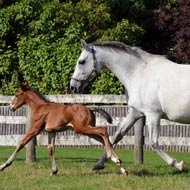
Innovative technique allows embryos to be frozen
Two 'test tube' foals have been born in the UK, thanks to advanced breeding methods that could offer a lifeline to breeds facing the threat of extinction.
The births were the result of a three-year programme led by the University of Liverpool, University of Surrey and Twemlows Stud Farm in Shropshire. They aimed to establish breeding options that are not routinely available in the UK.
One of the foals - named Twemlows Simba - was the first in the UK to be born using oocyte transfer - a technique whereby eggs are collected from a donor mare and transferred to a surrogate female before fertilisation.
The second foal, Twemlows Little ICSI, was born earlier this month using an intracytoplasmic sperm injection (ICSI). This involves a single sperm being injected into an egg through a thin glass pipette, creating an embryo that is transferred to the surrogate female.
Significantly, this method allows embryos to be frozen, as well as just semen. If this can be done reliably, scientists say a breed could be resurrected in a crisis by returning the embryos to surrogate mares.
Professor Caroline Argo, the project's academic lead, explained: "At the moment, we can freeze stallion sperm reliably but not horse eggs or embryos."
Now that ICSI has proved successful, however, she said it could be used more routinely and widely for conservation purposes.
Tom Beeston, CEO of the Rare Breeds Survival Trust, said this project is the best hope for resurrecting extinct breeds.
"Breeding numbers of all our native equine breeds continue to decline," he said. "If not halted soon our gene bank may be needed to reconstitute a breed, it really is that serious."
Image courtesy of the University of Liverpool



 The BSAVA has opened submissions for the BSAVA Clinical Research Abstracts 2026.
The BSAVA has opened submissions for the BSAVA Clinical Research Abstracts 2026.